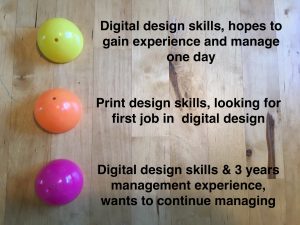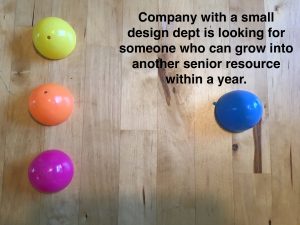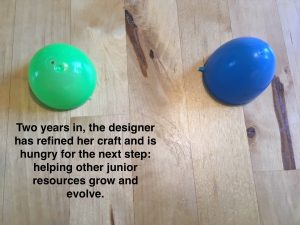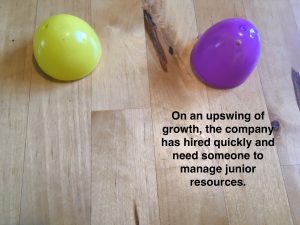 I coach employed people all week. I also coach employers. And all those hours of human talking has led me to a fundamental belief about the nature of employment: individuals and companies are like two sides of a plastic Easter egg. Healthy companies use managers to pay attention to the way they CLICK.
I coach employed people all week. I also coach employers. And all those hours of human talking has led me to a fundamental belief about the nature of employment: individuals and companies are like two sides of a plastic Easter egg. Healthy companies use managers to pay attention to the way they CLICK.
(Stay with me.)
When an employee is looking for a job, she comes with a set of skills and a genuine hunger to achieve things. Let’s use an example, a few candidates for a design role:
Companies have needs, too. Each job opening requires certain skills and specific drive. For example:
Job interviews are about matchmaking. Does the individual have the skillset and experience the company needs? Is she hungry for the kind of role this company offers? Is the company providing the benefits and salary she requires?
When these answers line up, CLICK! It’s a solid hire. The egg is whole.
Onboarding happens. Time moves on. And then one day, the employee evolves. (Pesky humans!) She wants something different. For example:
If the company can respond to this need, the match lines up again. CLICK!
Or sometimes the company evolves first. (Pesky companies!) The company needs something different. Like this:
If the employee can make the leap, the match lines up again. CLICK!
Retention is a communication strategy in which both sides find new ways to CLICK; managers are at the epicenter of this work. Performance reviews, regular 1:1s and company vision aren’t nice-to-haves. These assignments serve the mission of retention because they allow UNCLICKs to see the light of day. Does the employee still know what the company needs of her? Does the company know what drives and motivates her about her job these days? If the answer to either of these is no, heads up: it’s a matter of time before you’re all out of sync.
But what if the pivots are ultimately one-sided? The employee needs something the company cannot give or the company needs something the employee does not want. What happens then?
A departure, plain and simple — either the employee gives notice or the company lets go. At healthy, smart companies, departures do not feel like failures; they feel like mismatches that no longer CLICK. It’s not personal and a departure is what’s really best for both sides.
Because evolution and growth on all sides of employment are normal. (In fact, if they’re not happening, BE REALLY WEIRDED OUT. You may be working with robots.) Individuals, like companies, require regular realignments and I really believe that great managers are invaluable resources to keeping things healthy and moving forward.
Are you a newish manager? Want to learn how to see the future and predict your staffing problems ahead of time? Join us this summer in NYC for Plucky manager training, where we’ll help you learn how to launch humans.






